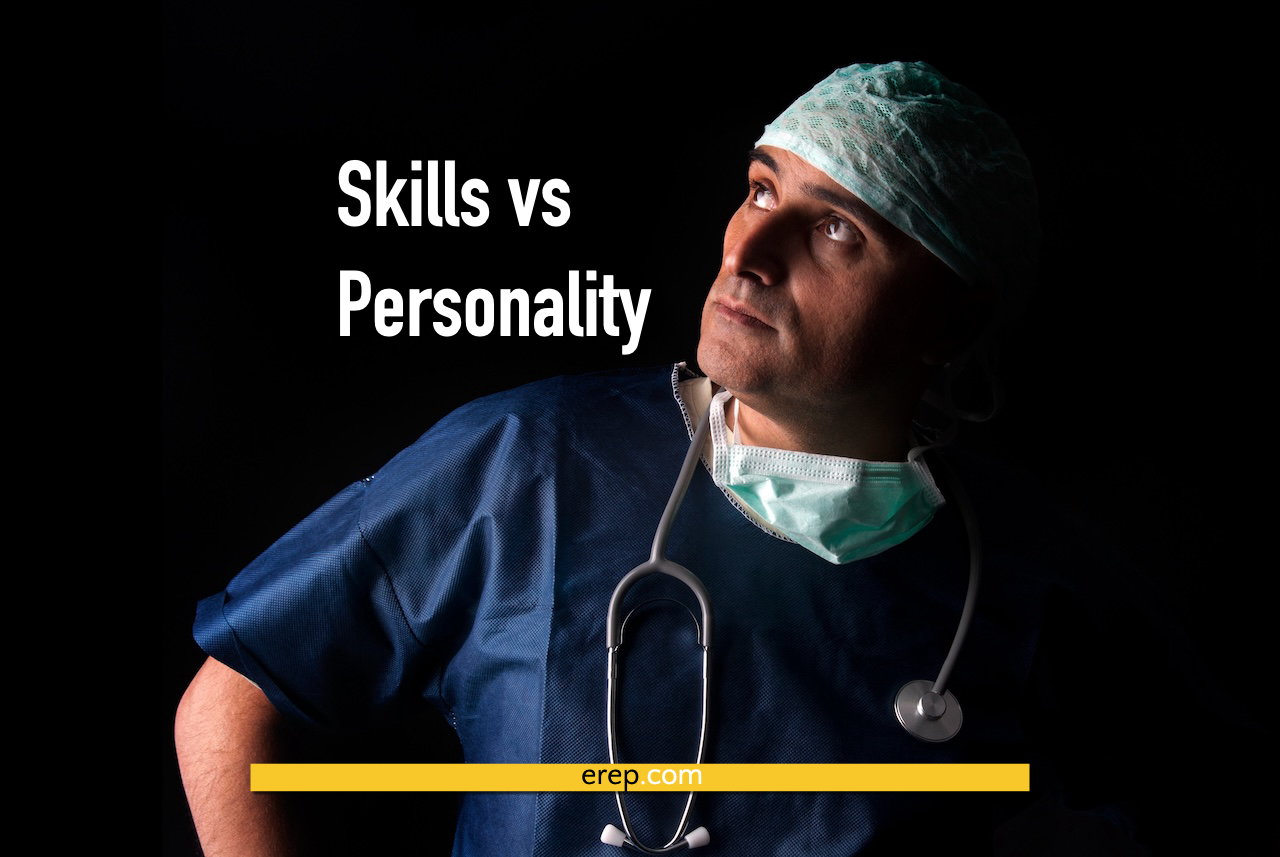Skills vs Personality
- By
- Steve Williamson, VP Digital Content at eRep
- Posted
- Monday, January 15, 2024

What's a more accurate predictor of success in the workforce: skills or personality?
It seems reasonable to say that having a winning personality will get you far if you work in sales. But what if you are a software developer, a chef in a busy restaurant, or you paint houses?
Does your personality type matter in roles where particular skills are a core requirement for the position? As it turns out it does, and by a wide margin.
Let's start with some definitions.
Skills are something you can acquire over time. They can be taught and they can be learned. You aren't born with any skills, and every skill you have today has been learned at some point in your life.
Skills are something you can acquire over time. Personality is something you're born with.
Your personality is often perceived in more vague terms. Most people think their personality changes at various stages of their life (not entirely true, apparently). Many think their personality changes moment to moment (true in a way, but we'll get into that shortly).
To understand this concept, first understand that there is a difference between behavior and personality.
Your behavior is how you act in any given moment, but your personality is your default and innate feelings and instinctual reactions and preferences.
How does this apply to the working world?
If you run a hospital and are hiring to fill the role of Chief of Surgery, you obviously want to hire someone who has the necessary skills and training to do the job. Is there a particular personality type that lends itself to success (or failure) in that role? Absolutely!
Remember, skills can be taught, but personality is something you're born with.
As you review resumes and screen candidates for your Chief of Surgery position, you want someone who can not only master the delicate and particular steps necessary to successfully operate on patients with a low incidence of complications, you also want someone who can lead and motivate the entire surgical team.
Your ideal candidate must navigate the dangerous political and financial waters of a critical department of your hospital. They must be able to take risks and have a knack for knowing when to do so. Finally, you want someone who can not only lead a medical team that is always seeking innovative new ways to save lives, but can also provide innovative ideas themselves.
Many of these crucial characteristics are aspects of a person's inherent and innate psychological profile that cannot be faked or 'acquired' by reading motivational memes on Instagram.
The ability to perform open heart surgery is a skill that can be taught and learned. The personality type needed to successfully lead a team of surgeons is something that must be present before that individual starts their first day of med school.
Who Do You Hire?
When evaluating candidates for the Chief of Surgery role in your hospital, the best practice (in a simplified version) would be to first screen each individual based on personality type. It's not until you've narrowed that list down do you verify they have the necessary training, skills and experience.
Why are these steps listed in that particular order?
Have you ever had a co-worker with loads of skill and experience but were a nightmare to work with?
Most of us have, probably more than once, and those difficult individuals likely dragged the rest of the team down with them. (Sometimes, as in the case of a rather large social media company that shall not be named, they can drag down the entire company.)
Assessing personality matters because personality can't be taught.
Everyone can alter their behavior to suit the circumstances, but a large deviation away from one's innate and unchanging nature cannot be sustained for very long.
At the very least, constantly altering one's behavior will cause burn out and can cause social and occupational damage to everyone around them.
Matching personality to the needs of the role doesn't just benefit the employer. The candidate benefits, too. They wake up Monday morning actually looking forward to their week because the nature of their work is highly aligned with their own preferences.
When someone's personality is matched to their role, their work makes them happy.
Notice we're not talking about aptitude here. Personality is about default behaviors and preferred activities. Those who enjoy what they do will have a much higher likelihood of being good at it than those who's personality is disconnected from their occupation.
When candidates are screened for personality type based on the needs of the role, both the employer and employee win.
Ultimately, one's innate and unchanging psychological and personality profile matters more than their skills and experience. The latter can be taught and learned but the former is something you've got at birth.
Go to eRep.com/core-values-index/ to learn more about the CVI or to take the Core Values Index assessment.

Steve Williamson
Innovator/Banker - VP Digital Content at eRep
Steve Williamson writes about work, teams, and the practical challenges of building systems that have to function in the real world. His background spans three decades of project management, software development, and technical team leadership across a range of industries. Outside of eRep, Steve is the author of a series of fantasy novels and most recently a murder mystery set in Portland, Oregon, and enjoys cycling and old-school tabletop role-playing games.
View additional articles by this contributor
Essentials
Additional Reading
Stay Updated
Employer Account Sign-up
Sign up for an employer account and get these features and functions right away:
- Unlimited Job Listings on eRep.com
- Applicant Search
- Applicant Tracking System (ATS)
- Unlimited Happiness Index employee surveys
- 3 full/comprehensive CVIs™
- No credit card required — no long-term commitment — cancel at any time
